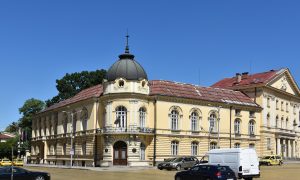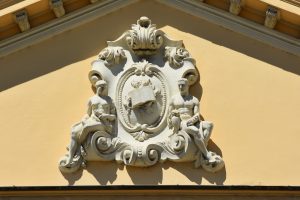 The Bulgarian Academy of Sciences is the successor of the Bulgarian Learned Society, founded on 12 October 1869 in the Romanian city of Braila. This is one of the peak events during the Bulgarian Revival along with the creation of the first Bulgarian chitalishte (community center) in Svishtov and the establishment of the Bulgarian Exarchate. Its purpose, enshrined in its first statute of 1869, was to disseminate enlightenment among Bulgarians, to improve the Bulgarian language and to study Bulgarian history and life, to be a scientific center and to establish contacts with similar scientific centers abroad.
The Bulgarian Academy of Sciences is the successor of the Bulgarian Learned Society, founded on 12 October 1869 in the Romanian city of Braila. This is one of the peak events during the Bulgarian Revival along with the creation of the first Bulgarian chitalishte (community center) in Svishtov and the establishment of the Bulgarian Exarchate. Its purpose, enshrined in its first statute of 1869, was to disseminate enlightenment among Bulgarians, to improve the Bulgarian language and to study Bulgarian history and life, to be a scientific center and to establish contacts with similar scientific centers abroad.
The first Chairman of the Society was the university scientist historian Marin Drinov, and one of its founders, Vassil D. Stoyanov, was the records keeper. After the Liberation of Bulgaria (1878), BLS moved its activities to Sofia and established itself as an authoritative scientific center with a rich social, cultural and political activity. The list of the founders and donors includes traders, writers, educators, scholars, public figures, revolutionaries… The names of Evlogi and Hristo Georgievi, Vasil Drumev, Dobri Voynikov, Rayko Zhinzifov, Vasil Levski, Lyuben Karavelov, Hristo Botev, Todor Ikonomov, Nesho Bonchev, Nayden Gerov, Dimitar Shishmanov, Marin Drinov, Vassil Stoyanov and many others have remained forever in our memory as builders of the largest scientific institution in our country.
With the help of its longtime chairman, politician and public figure Ivan Evstratiev Geshov, the Bulgarian Learned Society became a separate, independent institution. In 1911, it was renamed Bulgarian Academy of Sciences and the first law was adopted for it. In 1928, the central building of the Bulgarian Academy of Sciences, built on the land donated by Sofia Municipality, was completed. Twenty-two academicians mortgaged their personal property and invested BGN 3 million for construction. The first management of the Bulgarian Academy of Sciences included the re-elected Chairman of BLS Ivan Evstratiev Geshov, Lyubomir Miletich, Ivan Peev and Stoyan Argirov.
The Academy developed its activities in 3 scientific branches: historical-philological, philosophical-public and natural-mathematical. In 1947, the Grand National Assembly adopted a new Law on BAS. The Academy became a central state institution to which most of the research institutes established after 1945 in the country were subordinate. After 1991, the academic units of the Bulgarian Academy of Sciences became autonomous.
The Bulgarian Academy of Sciences conducts scientific research in accordance with universal values, national traditions and interests. It participates in the development of world science and helps to multiply the spiritual and material wealth of the nation.
 Establishment of the Bulgarian Academy of Sciences
Establishment of the Bulgarian Academy of Sciences
The Bulgarian Academy of Sciences (BAS) is the oldest institution in modern Bulgaria, established nine years before the restoration of Bulgarian statehood. It was founded on 29 September (11 October) 1869 and began its activity as a Bulgarian Learned Society on 30 September (12 October) 1869, embodying the aspirations of many Bulgarian patriots to align their people with the developed European nations.
The idea of a common Bulgarian learned society had been exciting the young Bulgarian intellectials ever since the first decades of the 19th century. Fervent patriots such as the Bulgarians from Veles Constantine Petkovic and Nesho Stoyanovich (the later metropolitan Nathanael of Ohrid) had founded “Bulgarian Matitsa” (Mother Bulgaria) in Constantinople in 1852, identified with “the great idea of the Bulgarians to make themselves a common, nation-wide institution for a more systematic and prudent dissemination of enlightenment among their people. ” Later on, there again, “Municipality for Bulgarian Literature” was founded by Dragan Tsankov which to distribute textbooks and other books, to develop the literary language and to publish “Periodical Journal”.
The steps of the Bulgarians in Constantinople were followed by those of the Odessian Bulgarians, from the patriotic appeals of G.S. Rakovski and L. Karavelov but the creation of a single enlightening and learned center to strengthen the national consciousness among Bulgarians was difficult in the absence of an own state organization. A series of events which occurred in 1867 and 1868 stirred the Bulgarian emigration and led to the grouping of the young Bulgarian intellectuals in a “brotherhood”. The formation and death of the Hadji-Dimitrov’s cheta (detachment) , Vasil Levski’s activity to form an internal revolutionary organization, the changes in the Habsburg empire were consolidating factors that would not had lead to the act of founding the Bulgarian Learned Society if it was not for the concepts of two young Bulgarians living in Prague: Vasil D. Stoyanov and Marin Drinov.
They decided in 1868 to organize a society that would unite the learned Bulgarians from different places and developed a draft statute of the Bulgarian Learned Society “Cyril and Methodius” based in Bucharest. Its aim was to “disseminate universal enlightenment and the improvement of the Bulgarian language, of Bulgarian history and of our letters”. By the autumn of 1869, they gradually managed to unite the Bulgarians in Romania around their idea, especially those in Braila. At that time, there worked writers and publicists such as Hristo Botev, Dobri Voynikov, Vasilaki Popovich, the prominent Bulgarian merchants N. Tsenov, K. Popovic, S. Beron, D. Mihaillidi.
In Braila, representatives of the Bulgarian municipalities of Braila, Bucharest, Galati, Bolgrad, Giurgiu, Chisinau, Vienna and Odessa adopted a statute drawn up at meetings from 26 to 30 September with the active participation of L. Karavelov. This Statute placed the Bulgarian Learned Society on a very broad democratic, national and, at the same time, European-wide basis. It was intended to unite all “educated Bulgarians and folk establishments” as well as to establish close links with scholars from all over the world – the “learned world in general”. Its main duties included the processing and improvement of the Bulgarian language, of the Bulgarian history and of the folk “our letters in general”, as well as the dissemination of the universal enlightenment and progress of the Bulgarian people.
The Constituent Assembly elected both governing bodies: Board of Trustees and Assembly of full members. On 30 September, the Constituent Assembly was dissolved and the present took the oath: “As a member of this society, I give an honorable word to perform my duties well and willingly, and good luck!”
On materials from:
A r n a u d o v, M. The Bulgarian Learned Society in Braila, S., 1966 (in Bulgarian)
P a s k a l e v a, V. The Bulgarian Learned Society in Braila (1869-1876). In: The History of the Bulgarian Academy of Sciences 1869-1969. S., 1971, 3-28 (in Bulgarian)

